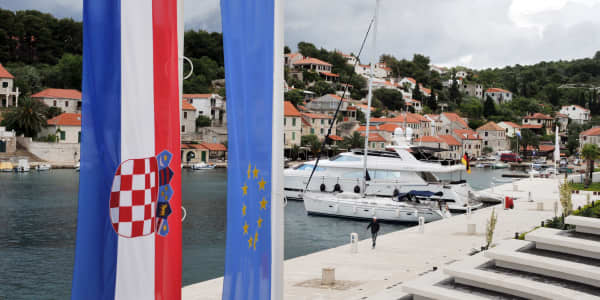Some 25 years after the fall of communism, the Czech Republic's capital, Prague, has become a favorite shopping destination of Russian and Chinese rich.
Pařížská Street is the go-to luxury shopping district in the heart of the capital, sitting on the edge of the touristy Jewish quarter, it has become the equivalent of London's Bond Street, according to head of Central Eastern Europe (CEE) retail for commercial property group JLL, Beatrice Mouton, who is based in Prague.
Read MoreRussian links to EUfar right exposed by French loan
Securing retail space on Pařížská has become increasingly expensive and is no longer easy to come by as demand has risen, Mouton said.
"You have a number of retailers enlarging their stores, most recently Louis Vuitton. They already had a smaller unit at the corner of Pařížská Street and they just opened a second store, which is much bigger, close to 800 square meters, last week," Mouton told CNBC.
Read MoreCzech Republic Rocked by Spying and Corruption Scandal
Cartier, Burberry, Christian Dior have expanded stores on the street in recent years, luxury leather goods maker Tod's has just opened a store there and designer ski wear brand Moncler is set to open up shop there shortly.
Tourism is behind Prague's luxury drive and the city was named the world's fifth best travel spot in 2014 by TripAdvisor, based on millions of reviews from travelers around the world. The city has become Europe's sixth most visited city and has the lowest unemployment rate among Central European capital cities according to Cushman & Wakefield data.
Between 2000 and 2013, the number of international tourists visiting Prague for both leisure and business doubled, reaching 4.75 million in 2013, according to JLL. The Czech Republic's accession to the EU in 2004 also boosted Prague's tourism industry, with guests' arrivals rising by nearly 28 percent in that year alone, the group said.
This influx of visitors has resulted in a surge in spending in the last five years, assisted by the change in the make-up of the tourists – there are now fewer Western European travelers and more Russian and Asian shoppers in Prague, head of consultancy and research at Cushman & Wakefield in the Czech Republic, Michal Soták said.
The Chinese middle class are leading the way – Asian tourists visiting Prague, with the majority from China, are mostly interested in fashion, Czech glass, watches and jewelry and based on information gathered from retailers, they form around 15-30 percent of the clientele of Pařížská Street, according to JLL data.
Retailers have noticed the increased demand and have responded by hiring shop assistants that are able to speak Chinese, the group said.
Read More'Game of Thrones' boosts this ex-communist country
Russian tourists, which are the biggest spenders in total numbers among non EU countries last year and behind 50 percent of all spending, which were the second largest group visiting Prague .
The average spend by a Russian tourist in Prague in 2013 was 6,771 CZK ($306), this compares with the average Chinese tourist spend of around 15,000 CZK ($678) according to recent Global Blue data.
With over 13 million foreign overnight stays in the city a year, Prague is the most visited capital in CE, meaning its local tourism market is larger than that of Berlin or Vienna and has the combined volume of Budapest, Warsaw, and Bratislava according to Cushman & Wakefield.
MasterCard estimated that tourists visiting Prague will spend $3.8 billion dollars in 2014 and the appetite from retailers is showing no signs of abating.
Read MoreWhy a weaker Germany could hit eastern Europe
"We keep on attracting the big names, I cannot tell you who they are, but there are still a number that want to enter the market," Mouton said.
"We are not competing against Russia yet, but definitely against the likes of Madrid and other European capitals," she added.





